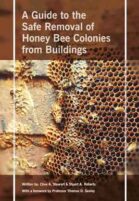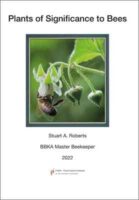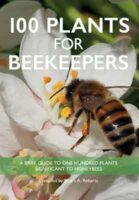The general public are becoming more aware of the plight of ‘bees’. This is, more accurately, the plight of pollinating insects. Dave Goulson, in his book, (see Silent Earth: Averting the Insect Apocalypse) has called it the ‘Insect Apocalypse’ and this has meant that many people now believe honey bees to be a protected species. The term ‘bees’ in this context means all bees and, in the UK, there are about 250 species of bees. However, this book is concerned with just a single species namely Apis mellifera the western honey bee.
In the UK, the general public think that the honey bee is a protected species, and that destruction is not an option. This is not true in the UK but the feral colonies (those living in cavities other than managed bee hives) are considered to be a valuable genetic resource and should not be destroyed if it can be avoided. In this book the authors describe the processes and thoughts any bee remover needs to undertake before, during, and after the removal of feral honey bees from a building or other such structure. Geoff Hopkinson B.E.M, NDB.
Many wild colonies of honey bees take up residence in buildings, and sometimes they do need to be removed. This book is a superbly detailed and richly illustrated guide to the removal process. I am delighted that the authors have included a thorough discussion of their experiences and recommendations regarding “Trap-out Removals” (aka ”Trap-Outs” and “Cut-Outs”). Removals performed in this way can foster the survival of colonies that have persisted without help from us, and so have shown that they possess the skills needed to cope with their parasites and pathogens. These are colonies that can help us to find our way back to treatment-free beekeeping. Professor Thomas D. Seeley.
Clive Stewart is responsible for the creation of the UK Bee Removers (UKBR) in 2020. The first organisation to be recognised specifically for the purpose of the small but growing industry of bee removal.
Stuart Roberts is an active member of the BBKA Examinations Board and a trustee for the International Bee Research Association (IBRA).





